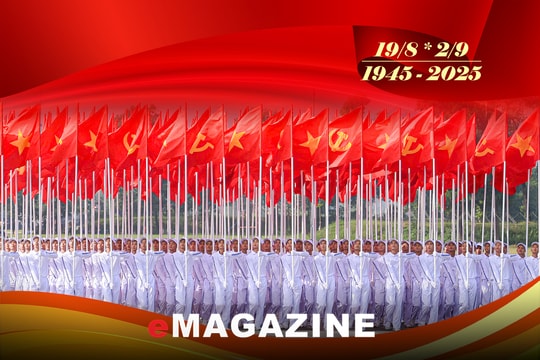President Ho Chi Minh and the Call for National Resistance
(Baonghean.vn) - Inheriting the heroic spirit of fighting the enemy and defending the country in the nation's history, President Ho Chi Minh wisely steered the revolutionary boat through the "thousand-pound hanging-by-a-hair" rapids with an important decision, a decision that represented the choice of history on December 19, 1946 - the day of national resistance.
The August Revolution of 1945 succeeded, the Democratic Republic of Vietnam - the first worker-peasant state in Southeast Asia was born, marking a great turning point in the history of the Vietnamese nation. From here, the revolutionary government was in the hands of the people; the working people became the masters of their own nation's destiny. However, the young revolutionary government was facing countless difficulties and challenges, the revolutionary situation at that time was as fragile as "an egg on the end of a stick" facing many enemies at the same time: famine, ignorance and especially foreign invaders.
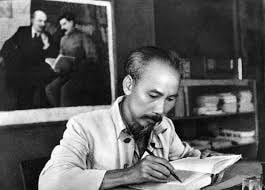 |
| Uncle Ho's call for national resistance had great power to help motivate and spread the spirit of fighting for the nation. |
On September 23, 1945, the French colonialists, hiding behind the British army, disarmed the surrendering Japanese army and opened fire on us in the South. President Ho Chi Minh, on the one hand, called on the people of the South and South Central to rise up to fight, and on the other hand, tried to negotiate with the French government to save peace. He signed the Preliminary Agreement with the representative of the French government in Hanoi on March 6, 1946.
Next, he went to France to direct our Government delegation to negotiate with the French Government in Fontainebleau. The negotiation failed because the French side still pursued the policy of dominating Vietnam. "While there is life, there is hope", President Ho Chi Minh signed the Provisional Agreement with the French Government on September 14, 1946. On September 16, 1946, he left the port of Toulon (France) to return home. On October 16, he met Dac-Giang-Lieu in Cam Ranh Bay. The ceasefire agreement in the September 14 Provisional Agreement was not implemented in the South.
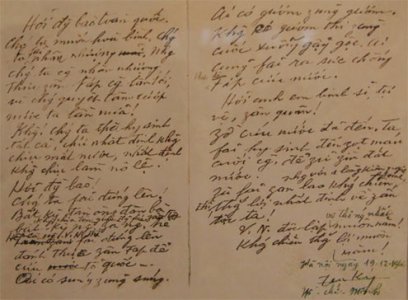 |
| President Ho Chi Minh's Call for National Resistance on December 19, 1946 |
In the North, at the end of November 1946, the French army occupied Hai Phong, Lang Son town and landed in Da Nang. In Hanoi, the French colonial army continuously opened fire and threw grenades at many places in Hanoi on December 15 and 16, 1946, such as burning down the information office on Trang Tien street, occupying the offices of the Ministry of Finance and the Ministry of Transport and Public Works. On December 17, 1946, the French army used vehicles to destroy our fortifications on Lo Duc street. In particular, they caused a massacre of many of our compatriots on Hang Bun and Yen Ninh streets, causing bloody conflicts at Long Bien bridge, Cua Dong area.
On December 18, 1946, General Moóc-lière sent us two ultimatums demanding the occupation of the Finance Department, demanding that we demolish all fortifications on the streets, disband the self-defense force and hand over the control of security and order in the capital Hanoi to them. France declared that if the above requests were not accepted by the Vietnamese Government, the French army would take action by the morning of December 20, 1946 at the latest.
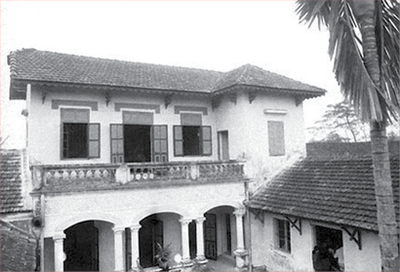 |
| The house in Van Phuc village (Ha Dong) where President Ho wrote the Call for National Resistance. |
Faced with that situation, on December 18 and 19, 1946, in Van Phuc village (Ha Dong), the Central Party Standing Committee held an expanded meeting chaired by President Ho Chi Minh, deciding to launch a resistance war nationwide.
At 8:00 p.m. on December 19, 1946, the army and people of Hanoi opened fire to start the nationwide resistance war. On December 20, 1946, at Hang Tram (Chuong My, Ha Dong), the Voice of Vietnam radio station broadcast President Ho's call for national resistance.
“Fellow countrymen!
We want peace, we must make concessions. But the more we make concessions, the more the French colonialists encroach, because they want to take over our country again!
No! We would rather sacrifice everything than lose our country, than become slaves.
Fellow countrymen,
We must stand up!
Any man, woman, old or young, regardless of party, religion or ethnicity. Any Vietnamese must stand up to fight the French colonialists to save the fatherland. Those who have guns will use guns, those who have swords will use swords, those who don’t have swords will use hoes, shovels or sticks. Everyone must strive to fight the French colonialists to save the country. Dear soldiers, self-defense members, and militiamen! The time to save the country has come. We must sacrifice every last drop of blood to protect the country.
Although we must fight a arduous resistance war, with a resolute determination to sacrifice, victory will surely be ours! Long live independent and unified Vietnam! Long live victorious resistance war.
Hanoi, December 19, 1946.
Ho Chi Minh"
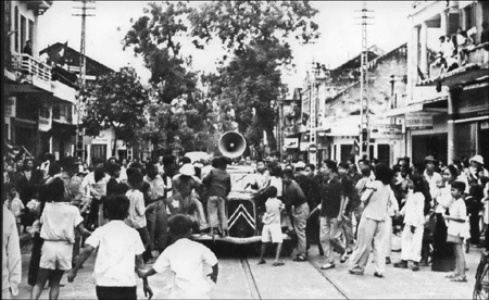 |
| Issue orders for national resistance. |
The full text of President Ho Chi Minh's "Call for National Resistance" is short but concise, simple, and resolute, with the power to encourage, motivate, and organize the resistance force extremely strongly. In the moment when the Fatherland was in danger, the situation was extremely dangerous, "a thousand pounds hanging by a thread", each sentence and each word in Uncle Ho's sacred call for resistance quickly permeated deeply into the hearts of our people, strongly arousing the pride, national self-respect, the tradition of patriotism, the indomitable heroism, and resilience of the Vietnamese people; it was a command to stir up the fighting spirit with the strength of revolutionary heroism and intelligence of the Vietnamese people with all available weapons, with a will to "die for the Fatherland", a decisive and steadfast attitude: "We would rather sacrifice everything than lose our country, than become slaves".
In the struggle against invaders, there is no other way but to use revolutionary violence against counter-revolutionary violence. When forced to fight a resistance war, President Ho Chi Minh resolutely encouraged the entire people to stand up and fight:
“No! We would rather sacrifice everything than lose our country, than become slaves.”
Ho Chi Minh declared the determination of our people: "We would rather sacrifice everything than lose our country, we would definitely not be slaves."
At the end of the appeal, Ho Chi Minh affirmed his belief in certain victory:
"Although we have to endure hardships in the resistance war, with a resolute determination to sacrifice, victory will definitely belong to our nation.
Long live an independent and unified Vietnam!
Long live the victory of the resistance!
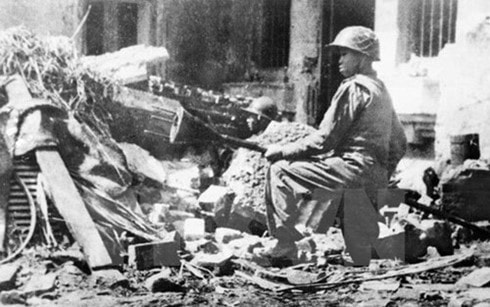 |
| The soldier holding the three-pronged bomb is ready to "die for the survival of the Fatherland". |
As President Ho Chi Minh's genius prediction, after nine years of protracted resistance, in 1954 - "The Dien Bien Phu victory resounded throughout the five continents, shaking the earth" demonstrated the strength of the extraordinary patriotism of our army and people, the talented and wise leadership of the Party and President Ho Chi Minh, the whole nation fought hard and sacrificed to regain half of peaceful Vietnam as a premise for an independent and unified Vietnam.
Thirty years later, in the spring of April 30, 1975, his invincible army raised the victory flag on the roof of the Independence Palace, ending the ten-thousand-day war, bringing independence and freedom to the nation, and reunifying North and South, bringing them together as one family.
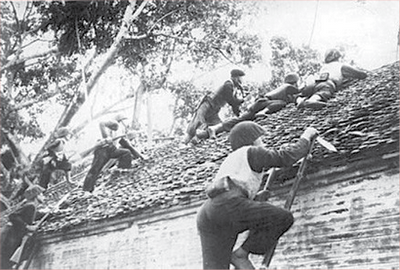 |
| National defense soldiers and people of the capital fought to defend every house and street corner in the first days of the national resistance war. |
It can be said that the national resistance day of December 19, 1946 demonstrated the ingenious and wise leadership of President Ho Chi Minh and our Party, closely following the practical situation, grasping the opportunity, choosing the right main front, calculating the exact time to open fire, turning passive into active, creating a new battle situation for the Hanoi front with the conditions to hold the enemy for two months, so that the whole country could move into a long-term resistance war. The opening of fire to launch the national resistance on December 19 in the middle of the capital was a rare case in history, demonstrating the art of starting a revolutionary war that was correct, courageous and creative.
On the occasion of the 70th anniversary of the National Resistance War, this is an opportunity for our entire Party, army and people to review the profound lessons of history, promote the spirit of great national unity, join hands and hearts to create a great driving force for the cause of building and defending the Fatherland, quickly bring the country out of the state of corruption, waste, poverty and backwardness, develop sustainably, integrate deeply and comprehensively with the world economy, stand shoulder to shoulder with the world powers as beloved Uncle Ho always wished.
Peace
(Synthetic)

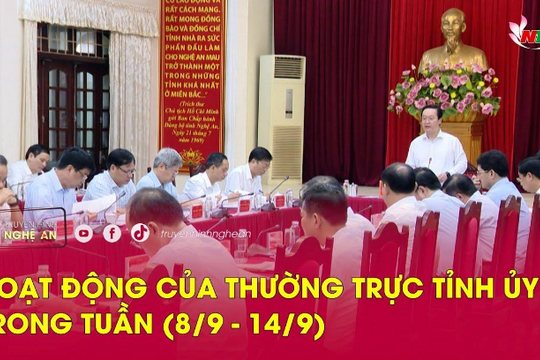
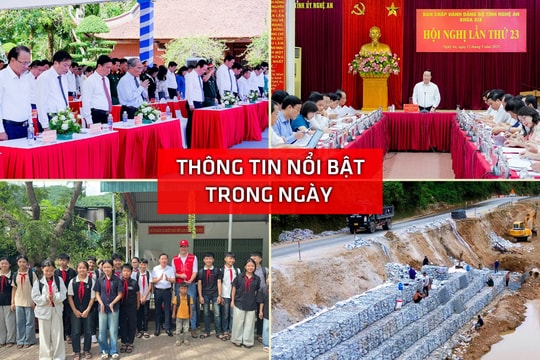
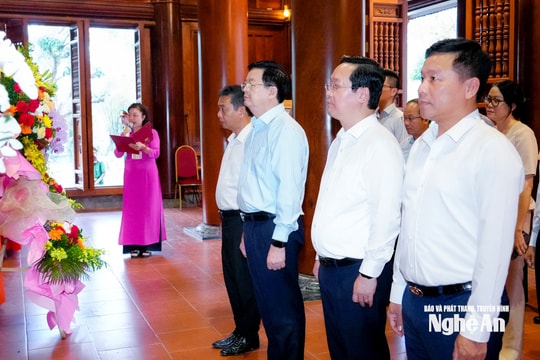
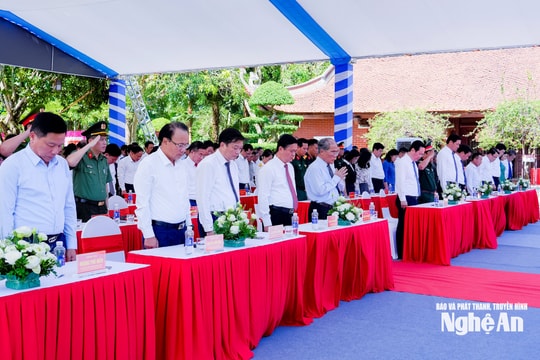
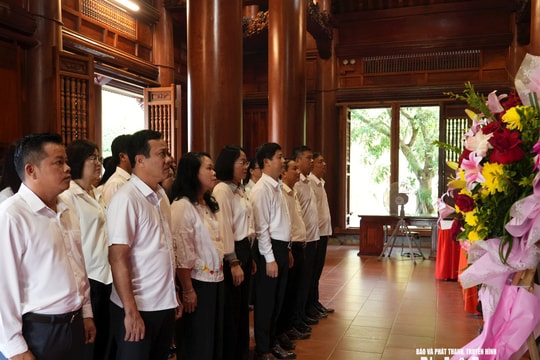
.jpg)
